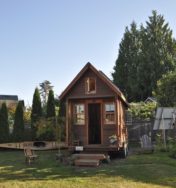
Three Rivers
FIRST there were the propane lamps. Then came wind turbines, followed by solar panels that powered William Shay’s off-the-grid vacation home overlooking Lake Billy Chinook.
And now, two decades after the first road was paved in Mr. Shay’s unusual central Oregon vacation community, sun-powered super homes hug the rimrock above his humble-by-comparison octagonal cabin.
”When I first came out here it was wild, wild West,” said Mr. Shay, who owns a vegetable oil distribution company in Portland, three hours to the northwest. ”People walked around with six-shooters and you thought there was a snake under every rock.”
Now it seems more as if there is a Porsche Cayenne S.U.V. in every garage at the 3,800-acre Three Rivers Recreation Area, home to more than 500 off-the-grid vacation homes, from trailers too long in port to air-conditioned McMansions with solar arrays costing tens of thousands of dollars.
”The lifestyle here, you can get simple or you can be real extravagant,” said Lorne Stills, whose late father, Doug Stills, started Three Rivers roughly four decades ago. The history of Three Rivers has been a trend from the former to the latter.
At first, what today is perhaps the country’s only off-the-grid second-home subdivision was just juniper and bunch grass, grazing land for cattle and sheep across the Metolius River arm of Lake Billy Chinook from the Confederated Tribes of Warm Springs Reservation.
Mr. Stills’s father originally envisioned building a hunting preserve, but his financial backers preferred the idea of selling lots to Portlanders and others looking to escape east of the Cascade Mountains on weekends, said Mr. Stills.
In the beginning people just pitched tents or parked their pickups on lots down beside the lake, said Mr. Stills’s widow, Delores. It was a place for working men to come and ”let their hair down,” said her son.
”When the campgrounds were full or they got kicked out for being too noisy, they came up here,” said Ms. Stills. There was no marketing beyond word of mouth, but by 1979 all the lots were taken, she said.
Eventually rough cabins started replacing the tents and trailers, but one problem remained: no power, water or telephone service for miles around.
Most buyers were of modest means but significant ingenuity, so there was a period of experimentation in power sources, from windmills to simple generators to modified automotive parts.
Some tried lighting their homes with propane lamps, but ”it was just about as dark inside as it was outside,” said Lorne Stills.
A hot shower was a coffee can with holes in the bottom hung from a peg out on the deck and filled with water heated on a propane stove. Or, if it was a hot enough day, a splash bath in the lake would suffice.
Three decades later, off-the-grid vacation homes have become practical for those not inclined to tinker and jury-rig car parts …